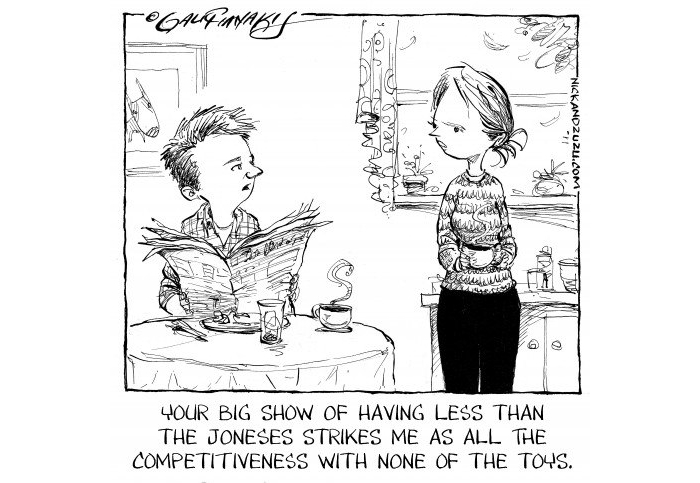Money can’t buy happiness, but it can put a smile on your face. Everybody needs things, everyone needs stuff. What separates us from the other animals is our ability to use things to make our lives easier and more comfortable. But how much stuff is too much stuff? Do we need to keep buying, consuming, and discarding things to maintain our quality of life? What’s so great about stuff, anyway?
Did you know that people go bankrupt more often when a neighbor wins the lottery? An extraordinary 2016 study (Does Inequality Cause Financial Distress?) found that an increase in the dollar amount of a lottery prize significantly increases the number of subsequent bankruptcy filings by very close neighbors of the lottery winner. It turns out that when a neighbor wins the lottery and spends money on things, the neighbors try to keep up and spend more, too, even though they haven’t won the lottery. This is sometimes called Keeping Up with the Joneses.
 The Problem with Things
The Problem with Things
The feeling of possession is wonderful, and buying things makes us feel good. One of the problems with things is that the desire to purchase them often encourages living outside our means. For some, the feeling of blowing a budget or spending (or betting) that last dollar can be exhilarating. It can be nearly narcotic living on the financial edge. But that edge is unsustainable and can have seriously deleterious effects on us, personally. We’re not just talking about the lower rungs of our society here. Executives who can’t afford the perks of the CEO are increasingly leasing a lifestyle beyond their means.
Another problem with things is the stress that they can cause. Making a huge purchase you can’t afford can give you an ounce of pleasure but a pound of pain. Living within your means may not seem very sexy, but it can dramatically decrease the stress in your life. George Carlin, in his manic NSFW way, keys in on the “weight” of things.
“That’s the whole meaning of life, isn’t it?” Carlin asks. “Trying to find a place for your stuff.” The psychological strain of keeping and carrying so much stuff can lead to some tortured logistics. Keeping track of all our stuff is a drain.
More ominously, UMass Professor of Economics Emeritus Richard D. Wolff tells us that the stuff we buy is burying us in consumer debt: “For the last 30 or 40 years, worker’s wages have been stagnant. But American standards of living have gone up and up. Why? Because of debt. We are able to buy more things because we borrow more money.” So stuff may be increasing our quality of life at the same time it’s holding us down.
What’s So Great About Stuff, Anyway?
Not everyone sees the proliferation of stuff as a threat. Frank Trentmann’s Empire of Things offers a history mankind’s interaction with physical things. The tome presents stuff as a reflection of individual memory and emotion, or part of the creation of group or personal identities. But even Trentmann’s refutation of the theory of conspicuous consumption contains caveats: “The home has morphed into one gigantic socket,” he writes.
I’ve previously written about ways to avoid the pitfalls of too many things. If you don’t have a budget, make one and stick to it. Invest your money in experiences rather than stuff. Don’t go broke trying to look rich.
But here’s my main point. Like ballast, our stuff could actually be holding us down. The desire to purchase and possess and maintain things might just take up so much of our time and energy that the true cost is much more expensive than what we actually pay in money.
Possessions are merely things, and things can always be replaced. Memories cannot be replaced. Relationships cannot be replaced. People cannot be replaced. Only when we lose focus on who and what is truly important do we seek to fill the void with stuff.
